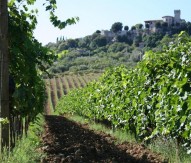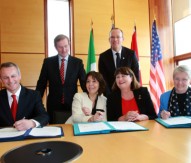
The Atlantic Ocean: “Our next great frontier”
The EU has signed a new international collaboration maritime agreement with the United States and Canada. ‘The Galway Statement on Atlantic Ocean Cooperation’ will see a review of existing bilateral science and technology co-operation, particularly relating to ocean observation and public communication initiatives, as well as new priorities being agreed for future co-operation, including promoting the mobility of our researchers.
The signing of the new agreement took place at the Irish Marine Institute in Galway in western Ireland and was overseen by Máire Geoghegan-Quinn, European Commissioner for Research, Innovation and Science, and Maria Damanaki, European Commissioner for Maritime Affairs and Fisheries. Also in attendance was Irish prime minister, Enda Kenny, and Simon Coveney, the Irish Minister for Agriculture, Marine and Food.
Geoghegan-Quinn began her speech by quoting Paul Snelgrove, a Canadian oceanographer at the Memorial University of Newfoundland. She cited his affirmation that “we know more about the surface of the Moon and about Mars than we do about the deep sea floor, despite the fact that we have yet to extract a gram of food, a breath of oxygen or a drop of water from those bodies”.
Trans-Atlantic collaboration
The Irish Commissioner continued by raising the importance of research into the oceans and how they could provide answers to key challenges facing European society, in particular climate change, food security and new sources of energy – key issues that will be tackled in Horizon 2020. Geoghegan-Quinn said the seas had already provided some possible solutions, including new biomedicines to tackle chronic pain and cancer.
The Commissioner went on to describe the oceans as the “next great frontier”, adding: “Our great challenge is to captivate, nurture and encourage a generation of marine pioneers who will think about our oceans – the final frontier – with the same fascination and ambition as previous generations did about space.”
Geoghegan-Quinn described the signing of The Galway Statement as marking the next step in a collaborative scientific journey between the United States, Canada and the EU that will ultimately advance knowledge for all.
“The Galway Statement is one of the first successes of the new strategy for international co-operation in research and innovation launched by the European Commission last September. This strategy represents a major change in how we co-operate internationally, and I am confident that it will transform how we collaborate with international research partners on marine research.
“The EU remains committed to supporting marine science. Around €1.9bn is spent on marine and maritime research every year in the EU, with 11% of this, or €210m, coming from the EU’s research framework programme. Since 2002, the 6th and 7th Framework Programmes have invested more than €2bn in more than one thousand marine research projects,” the Commissioner said.
She continued: “Besides exploring the physical processes, ocean chemistry and bio-geography, European research has focused on taking a holistic approach to understanding biological and ecosystem responses, as well as possible adaptation strategies and the resulting socioeconomic effects. More recently, research has also focused on the sustainable management of marine ecosystems and concerns such as warming and ocean acidification.”
Horizon 2020
Further EU investment in marine research will continue under Horizon 2020. The field will fall under the Societal Challenges pillar and the objective covering ‘Food security, sustainable agriculture, marine and maritime research, and the bioeconomy’. The EU’s next research and innovation framework programme will also see a greater emphasis on international collaboration between the Union and other international partners.
“Our proposals for Horizon 2020 provide strong support for Commissioner Damanaki’s policies, for the EU’s Integrated Maritime Policy, for the Blue Growth Strategy and now for the priorities of the Atlantic Strategy, both to increase our knowledge and to maximise the innovation potential of future research activities. Horizon 2020 will rise to these challenges and will enable us to achieve great things together in the coming years.
“Marine research issues will be addressed across all areas of Horizon 2020, especially under the Societal Challenges pillar of the programme, with a broad range of actions in many areas of co-operation, including those identified yesterday by our scientific experts,” Geoghegan-Quinn added.
“The programme also aims to boost Europe’s scientific co-operation with other parts of the world, building on good experiences such as the Group on Earth Observation, and large scale projects such as EPOCA, Ice2Sea and EUROBASIN, which study the impacts of climate change on Atlantic marine ecosystems. Research teams from Canada and the United States are already actively collaborating with their European colleagues in these projects.”
EU co-operation
The Commission will work closely with member states under The Galway Statement. The EU institution will also be encouraging Joint Programming Initiatives led by member states, particularly those on Oceans and Climate Change, to become involved in future related activities. France, Ireland, Portugal, Spain and the UK, in addition to Norway and Iceland, are already co-operating in the SEAS-ERA-NET project to set up a strategic research agenda for the Atlantic.
Geoghegan-Quinn has described the new agreement as “an anchor for future transatlantic co-operation” which will help align future marine research priorities between North America and the EU.
“Today we are entering a new era of transatlantic co-operation – we are raising our ambition for ocean discovery above sectoral interests and putting marine research on a new global level that transcends national borders, making literal the bonds connecting Europe, Canada and the United States.
“So let’s commit ourselves to ensuring that future generations stop seeing the oceans as spaces between nations and start to see them for what they truly are – the reservoirs of life and renewal that unite us.”
Commissioner Máire Geoghegan-Quinn




